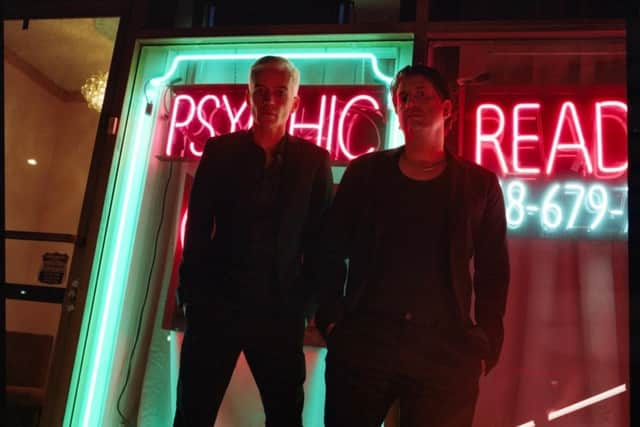Album reviews: Seasick Steve | Miley Cyrus | The Avalanches | Jamie Sutherland


Seasick Steve: Blues in Mono (self-released) ***
Miley Cyrus: Plastic Hearts (RCA) ***
The Avalanches: We Will Always Love You (EMI) ****


Jamie Sutherland: Bruise (J Sharp Records) ****
If anyone is well placed to record simply under lockdown conditions, surely it is Steve Wold, better known as Seasick Steve, a man who at his most humble beginnings couldn’t even afford the full six strings on his guitar – or so goes the legend.
Across his career, he has struck a mainstream-friendly balance between lo-fi stylings, including homemade instruments, and a radio-friendly production sheen. But now seems as good a time as any to adopt a more homespun approach with this surprise album release.
Advertisement
Hide AdAdvertisement
Hide AdAs the title suggests, Blues In Mono is the basic package – one voice, one guitar, one microphone, recorded in tribute to the original bluesmen captured in the field recordings of the 1930s and 40s, mixing meandering originals and covers such as Mississippi Fred McDowell’s Fred’s Worried Blues, the absorbing reverie of Charley Patton’s Moon Going Downand the 60s blues boom timewarp of Tommy McClennan’s Whisky Headed Woman.


It’s hard to catch on to a melody in the mantra-like simplicity of Goin’ Down South, while the gentle rumination of Well Well Well contrasts with the earthiness of Buddy Brown and its vital lockdown concerns – “when a man gets hairy, you know he needs a shave”.
There is nothing front porch about Miley Cyrus’s latest incarnation, as the shape-shifting singer straps on her studded leather bracelets and makes like a rock chick on her new album. Plastic Hearts offers little as engaging as her Mark Ronson collaboration Nothing Breaks Like a Heart but with her raspy vocals she is eminently capable of filling those biker boots in trashy Sunset Strip style.
Hers is a commercial, cartoony iteration of the genre – she namechecks Sunset party palace the Chateau Marmont on the finger-snapping pop of the title track, tries on a Bon Jovi-esque ballad, Angels Like You, for size, and duets with her most obvious inspiration, Joan Jett, on Bad Karma.
As if to clarify where she is coming/stealing from, she recruits Stevie Nicks for a faithful if slightly underpowered take on Nicks’ hoary classic Edge of Seventeen alongside bonus live hollers through Blondie’s Heart of Glass and The Cranberries’ Zombie, but she is altogether more suited to the glassy balladry of Never Be Me and Golden G String, both more roots than rock, which bring the album to a relatively dignified close.


In a herculean show of diligence, Australian outfit The Avalanches composed their classic 2001 debut Since I Left You entirely out of samples – 3,500 of them. Perhaps unsurprisingly, it took 16 years to produce a painstaking follow-up whereas their relatively speedily convened third album We Will Always Love You employs a tantalising line-up of guest vocalists such as Tricky, Karen O and Neneh Cherry alongside their signature cut-and-paste samples ranging from Burt Bacharach to Steve Reich to create a twinkling, trippy psychedelic soul suite.
Highlights on the 70-minute journey include a sultry star turn from Sananda Maitreya aka Terence Trent D’Arby, on Reflecting Light, delivering a weightless, rapturous duet with a sampled Vashti Bunyan, while the dionysian Perry Farrell of Jane’s Addiction leads the dance on hippy disco track Oh the Sunn!
Advertisement
Hide AdAdvertisement
Hide AdBroken Records frontman Jamie Sutherland finally releases his debut solo album three years after recording it with Neil Pennycook of Meursault and an ensemble of his Edinburgh musical associates. Bruise undulates between the gentler folk reveries of Lost, the Tim Buckleyesque pastoral blues of Falling Down and bittersweet hymn to ageing Send Me the Darkness, and the fuller sound of his band, some of whom play on the album, serving to whip up a propulsive rootsy ruckus on Be Careful Don’t Break My Heart and tumble into the sweeping currents of Cold Water.
CLASSICAL
Prokofiev Symphony No 5 | Myaskovsky Symphony No 21 (LAWQ Classics) *****
Composers claiming to have written “a symphony on the grandeur of the human spirit” are too numerous to mention here. That Prokofiev succeeded in doing so is beyond question, even in the first few bars of his Fifth Symphony. A wholesome, brooding melody emerges with questioning but authoritative inevitability, and beyond it multiple ideas evolve like an encyclopaedia of the troubled Russian: from brittle pragmatism to ripe, churning emotions; from stabbing humour to lugubrious reflection. Who better than Vasily Petrenko to add another recording to the catalogue, featuring the Oslo Philharmonic of which he was, until recently, chief conductor. His impact on this orchestra – now a passionately engaged corporate body – is palpable. Partnering the Prokofiev is Nikolai Myaskovsky’s Symphony No 21 (he wrote 27), primarily a child of Soviet compositional diktat, but not without heartwarming adrenalin rushes; and given this sumptuous performance, well worth a listen. Ken Walton
JAZZ
Tina May: 52nd Street (and other tales) (33 Jazz) *****
Celebrating the songs of the late Duncan Lamont, the widely regarded Scots saxophonist and composer, and produced by his son, Duncan Junior, 52nd Street (and other tales) sees singer Tina May in superb form alongside Ronnie Scott’s house band – pianist James Pearson, bassist Sam Burgess and drummer Chris Higginbottom, plus trombonist Mark Nightingale, percussionist Phil Hopkins and accordionist Karen Street. May sizzles through the title track, band bouncing snappily alongside, saluting bygone Manhattan glories, her pliant vocals nurse the wry Darker Side of the Rainbow, and the rich, bluesy regret of The Algonquin Hotel sees her really sing the story, raising the ghost of Dorothy Parker. English Folk Song, with lyrics by Spike Milligan, may be affectionate pastiche, but it is delivered with heart and poise while Lewis Carroll collides gloriously with swaggering piano blues in Back Through the Looking Glass Again. Jim Gilchrist
A message from the Editor:
Thank you for reading this story on our website. While I have your attention, I also have an important request to make of you.
The dramatic events of 2020 are having a major impact on many of our advertisers - and consequently the revenue we receive. We are now more reliant than ever on you taking out a digital subscription to support our journalism.
To subscribe to scotsman.com and enjoy unlimited access to Scottish news and information online and on our app, visit https://www.scotsman.com/subscriptions
Joy Yates, Editorial Director